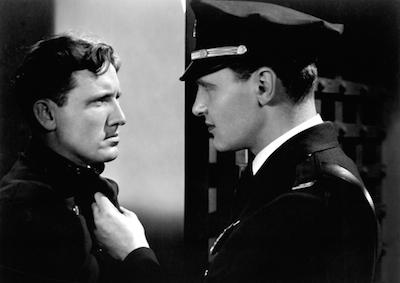Gangster Arnold Rothstein, remembered in history as the man who fixed the 1919 World Series, was shot in 1928 and, as he lay dying, refused to name his killer. In 1933, Fox Film contracted his widow, Carolyn Rothstein, to write a tell-all book as the basis for a film à clef in which, camouflaged as “Virginia Golden,” she became a paragon of virtue, wringing her hands behind a firewall of blithe ignorance.
Substantive details were provided by her ghostwriter, Donald Henderson Clarke, a Rothstein confidante who had published In the Reign of Rothstein in 1929. “My picture of Rothstein,” he wrote, “… is simply of a quiet, mediumsized man, inconspicuously dressed, in this restaurant or that, in this courtroom or that, or strolling on a sidewalk with a friend, frequently reaching down to snap the garter on his sock, his ready laughter revealing those white, even, artificial teeth, hardly whiter than his pallid skin, which was like a woman’s.” Dramatic fabrications were added by writer-director Edwin Burke until the full title of the resulting film, Now I’ll Tell by Mrs. Arnold Rothstein, became something of a misnomer.
Spencer Tracy is designated “Murray Golden,” changed at the behest of the Production Code Administration, which unofficially forbade the celebration of name criminals. As portrayed by the stately Helen Twelvetrees, Virginia is a patrician blueblood antithetical to the 21-year-old showgirl, Carolyn Greene, whom Rothstein wed in 1909. To accommodate the Baseball Commission, Murray Golden fixes boxing matches, not baseball games and his narrative is unencumbered by other Rothstein diversions like bootlegging, labor racketeering and murder. Variety wasn’t buying the subterfuge, cagily noting that Tracy’s Golden resembled Rothstein “in his moods and methods, many of which will be recognized by those who knew or studied him.” Shirley Temple’s kidlet gets the smiles but Alice Faye’s prostitute gets the musical number in this restored pre-Code version. —Scott MacQueen
Director: Edwin J. Burke. Production: Fox Film Corp. Distribution: Fox Film Corp. Producer: Winfield Sheehan. Screenwriter: Edwin Burke. Based on the book Now I’ll Tell by Mrs. Arnold Rothstein. Cinematographer: Ernest Palmer. Art Direction: Jack Otterson. Editor: Harold Shuster. Music: Arthur Lange. Cast: Spencer Tracy, Helen Twelvetrees, Alice Faye, Robert Gleckler, Henry O’Neill. 35mm, b/w, 87 min.
Restored from a 35mm nitrate print and a 35mm nitrate composite dupe negative. Laboratory services by The Stanford Theatre Film Laboratory, Film Technology Company, Inc., Pacific Title & Art Studio, Audio Mechanics, DJ Audio, Simon Daniel Sound. Restored in association with 20th Century Fox. Special thanks to: Katie Trainor—the Museum of Modern Art.






 Mobile Navigation
Mobile Navigation

